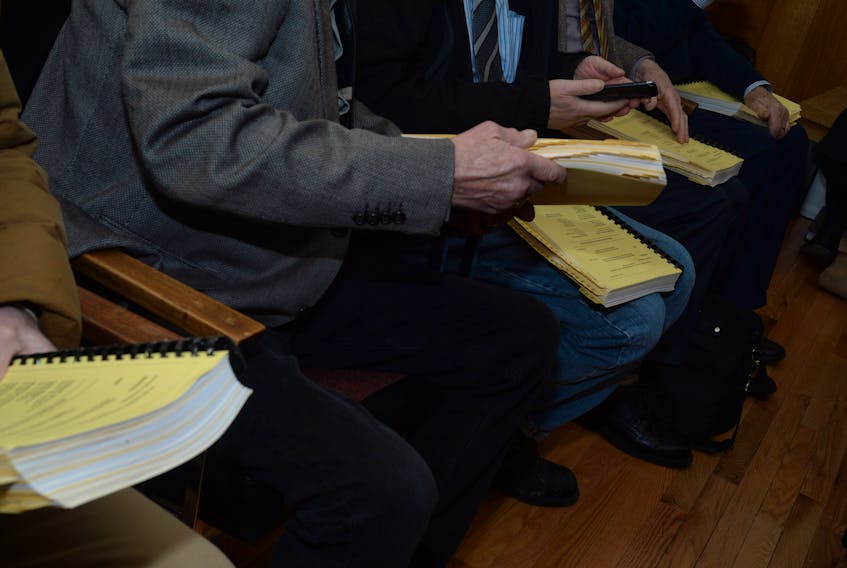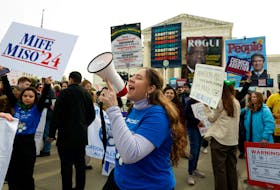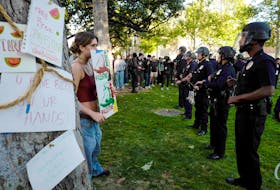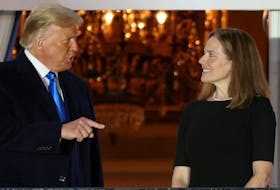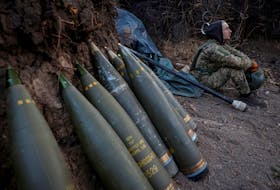ST. JOHN'S, N.L. — At the back of the tiny Supreme Court of Newfoundland and Labrador Appeals Division courtroom Thursday, his weathered 80-year-old hands followed along the lines in the thick legal document, as the lawyer told the court he wouldn’t repeat what everyone else in the room knew was godawful.
Nobody could know it, though, like the 80-year-old, or the few others who sat alongside him and had also experienced such terrible things.
Even though it was said at a Supreme Court civil trial, and been pored over by lawyers on either side of the case, it was still painful to hear, even if Ottawa lawyer Eugene Meehan chose not to repeat the most disturbing details, in recognition of those Mount Cashel sexual assault victims at the back of the courtroom.
“Boys in their beds,” Meehan said, emphasizing each of those particular words as all eyes in the courtroom focused on him, including new Archbishop Peter Hundt.
In that phrase, Meehan was referring to how certain Christian Brothers roamed from bed to bed sexually abusing the boys in the infamous orphanage dormitory several decades ago. But there were other incidents he chose not to speak out loud. A boy beaten naked in the shower. Excruciating details of sexual encounters around the orphanage.
Meehan is co-counsel with St. John’s lawyer Geoff Budden in an appeal of the decision by Justice Alphonsus Faour not to find the Roman Catholic Episcopal Corp. — the legal entity of the local Catholic Church — liable for sexual abuse of boys in Mount Cashel several decades ago by certain Christian Brothers.
Court of Appeal Chief Justice Deborah Fry, Justice Lois Hoegg and Justice Francis O’Brien began hearing the appeal Thursday.
“The facts here are so egregious in terms of what was done to the boys,” Meehan told the court.
That the boys were abused is not being questioned.

“There was a lot of emotionally charged evidence,” Toronto lawyer Mark Frederick told the Court of Appeal late Thursday when the Episcopal Corp.’s turn came to begin its argument.
Frederick was talking about the trial, but allowed that emotion couldn’t even be kept from the court of appeal proceeding earlier Thursday.
He began by acknowledging on behalf of the church what was done to the boys.
“There were terrible things that occurred at Mount Cashel,” he said, pointing out the Episcopal Corp. has made no effort to minimize what the men suffered as boys.
But he said of the church corporation, “somehow they have become responsible for those terrible things.”
The archdiocese has always insisted it didn’t run the orphanage and the Christian Brothers were a separate, independent order.
Meehan again argued the opposite — the church was so involved the archbishop at the time the orphanage was being built provided the land when the government wouldn't chip in funding, and went so far as to get down to the nitty gritty of ordering the beds.
(Deceased priests and the abuse victims cannot be named due to a publication ban.)
Meehan said it’s clear the archbishop had the power and he wielded it.
“The archdiocese is in here with both feet. If they had five feet, they’d be in it with five feet,” he said of the church's involvement with the Christian Brothers and the orphanage.
Meehan argued the trial judge failed to look at the big picture when it came to deciding whether the church should be liable, and he used some iconic but unconnected symbols to illustrate his case — Legos, Hungry Man dinners and even the Newfoundland and Labrador coastline.
He said if you sit down and eat the meat, potatoes, vegetables and dessert from the compartments of a Hungry Man dinner in front of the TV, you have a TV dinner, even if it’s not written on the box.
One Lego won’t make a house, he said, but if you put a bunch of them together, they make a house.
He described the same idea with the jagged cliffs and coves that make up the coastline.
“The archdiocese is in here with both feet. If they had five feet, they’d be in it with five feet." — Mark Frederick
Different pieces of evidence should have been taken together to conclude the church was liable, based on its decision-making power over the Christian Brothers operating in the diocese, Meehan said.
It’s like playing tag, he said.
“If the trial judge touches you and you’re it, everybody else walks away? … It’s not that simple,” Meehan said.
As for what the parish priest’s role was, Meehan did the math for the court, citing 129,800 interactions between the priest and the boys through mass and confessions. He said that defies any conclusion the priest had minimal interaction in the orphanage.
(The priest lived on the site, though he had a separate entrance, as the parish also included residents in the neighborhood.)
Meehan said evidence shows the priest was spoken to 18 times by someone about abuse going on at Mount Cashel at the time.
Meehan mentioned the modern-day #MeTOO movement, during questioning from the justices.
“Let me be direct: one should be enough,” he said of the reporting of abuse and how it should have been handled.
He also said that because nothing was done by church officials — there were three agreed statements in which boys told the parish priest, inside and outside the confessional, about sexual abuse — that could have caused the Christian Brothers’ risky behaviour to increase.
Hoegg asked Meehan whether, based on his theory, the Christian Brothers saw nothing being done by church authorities as a licence to continue abusing boys.
Yes, Meehan said.
Frederick continues Friday. He suggested Thursday that the trial judge was right to evaluate what was weak and strong evidence in making his conclusions on the case.
The case would be simple, Frederick said, if there was a contract in hand between the Christian Brothers and the church exactly spelling out responsibility.
“But that is not the case,” he said.
The Mount Cashel sexual abuse scandal is most associated with the abuse of boys of a different era, the 1970s and ’80s — the scandal that prompted the 1989-90 Hughes Inquiry. That era was not part of this civil case, and the boys from earlier decades were not part of compensation from the provincial government when it settled a block of cases from the ’70s and ’80s more than 20 years ago.
Four test-case John Does represented more than 60 claimants from the era of the late 1940s to ’60s who said the church should be held liable for the abuse they suffered at the hands of certain Christian Brothers. The case also affects the unresolved cases of about 20 others represented by various lawyers.
The civil trial was heard in 2016 and the decision came out in March 2018.

